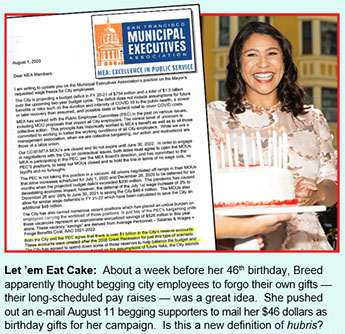 August 2020
August 2020Let ’em Eat Cake: Happy Birthday to Me; No Raises for Thee
City Managers Reject Breed’s Budget Plea
Printer-friendly PDF file
 August 2020
August 2020
Let ’em Eat Cake: Happy Birthday to Me; No Raises for Thee
City Managers Reject Breed’s Budget Plea
Highest-Paid City Employees Instantly Say, “Hell No!”
Cops: 1) Cave In to Breed; 2) Sabotage Other Unions
Labor Council's PEC Rejects Mayor’s Proposd Cuts
[See August 22 Update at End of Article]
by Patrick Monette-Shaw
Pivoting from the COVID-19 fast ball to solving the City’s budget deficit slow ball, Mayor Breed pulled out her cudgel. She struck out.
She should have reached for an SFGH surgical scalpel. That might have prevented her own senior City managers represented by the MEA from almost instantly rejecting her budget plea.
Despite the use of “Association” in its name, the MEA (Municipal Executives’ Association) is a labor union representing the City’s highest-paid senior managers. Its members do such things as analyzing budget data for the Mayor. They know the underlying budget data better than the Mayor does.
 Displaying sheer hubris, Mayor Breed demanded in the Examiner on July 31 that City employees postpone scheduled raises in December, raises Breed claims will save between $55 million and $270 million. They were actually raises due July 1, 2020 that had been first postponed automatically by explicit language incorporated into labor union contracts members had ratified and adopted before July 2019. Of course, she’s not mentioning that she’s now demanding a second delay to the long-scheduled raises.
Displaying sheer hubris, Mayor Breed demanded in the Examiner on July 31 that City employees postpone scheduled raises in December, raises Breed claims will save between $55 million and $270 million. They were actually raises due July 1, 2020 that had been first postponed automatically by explicit language incorporated into labor union contracts members had ratified and adopted before July 2019. Of course, she’s not mentioning that she’s now demanding a second delay to the long-scheduled raises.
Stomping her foot and shaking her curls, Breed asserted that if City employees don’t agree to re-open and hopefully re-ratify their contracts by agreeing to delay raises they desperately need, layoff’s will ensue. She didn’t mention contracts between the City and its labor unions have not formally been forced to re-open since then-Mayor Newsom forced unions to re-open contracts in February 2009 to accept unpaid furlough days in lieu of a scheduled 3.75% pay raise.
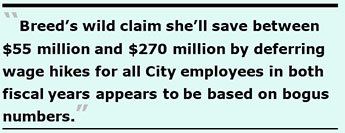 City contracts are currently closed and don’t expire until June 2022. Re-opening contracts to approve negotiated side letters mid-course may be routine. But re-opening contracts to alter negotiated scheduled pay raises rarely happens, even in San Francisco. You could count that using a single hand.
City contracts are currently closed and don’t expire until June 2022. Re-opening contracts to approve negotiated side letters mid-course may be routine. But re-opening contracts to alter negotiated scheduled pay raises rarely happens, even in San Francisco. You could count that using a single hand.
The $55 million savings Breed hopes for represents just four-tenths-of-one-percent (0.4%) of the $13.7 billion City budget for FY 2020–2021 she submitted to the Board of Supervisors.
Breed’s second-year budget for FY 2021–2022 is $12.6 billion, for a combined total of $26.3 billion across the two fiscal years (FY 2020–2021 and FY 2021–2022). She also wants employees to defer additional raises already negotiated for FY 2021–2022, and wildly claims she’ll save up to $270 million by deferring wage hikes for all City employees in fiscal both years. Although $270 million would represent just 1% of the $26.3 billion combined two-year budget, both the $55 million and $270 million amounts Breed is tossing around appear to be based on bogus numbers.
Breed Ignored Two Budget Hurdles
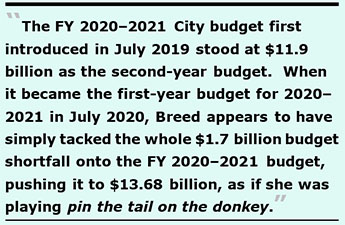 When Mayor Breed met with her director of public policy and finance, the City Controller, and the Board of Supervisors’ Budget Analyst to prepare the March 2020 Joint Report required before developing the City budget for Fiscal Years 2020–2021 and 2021–2022 starting on July 1, 2020, all four knew the first hurdle involved a $1.7 billion budget shortfall.
When Mayor Breed met with her director of public policy and finance, the City Controller, and the Board of Supervisors’ Budget Analyst to prepare the March 2020 Joint Report required before developing the City budget for Fiscal Years 2020–2021 and 2021–2022 starting on July 1, 2020, all four knew the first hurdle involved a $1.7 billion budget shortfall.
When they met, they knew a second hurdle involved 50 separate union contracts staring them in the face that contractually promised pay raises on July 1, 2020.
They introduced a first-year budget of $13.7 billion for FY 2020–2021, adding another $1.4 billion above Breed’s $12.3 billion budget for FY 2019–2020, essentially ignoring the $1.7 billion budget shortfall.
In fact, when the FY 2020–2021 budget was initially introduced in July 2019 and adopted as the then-second-year budget, it stood at $11.9 billion. But it grew by $1.7 billion to $13.68 billion when it became the first-year budget for FY 2020–2021 in July 2020, as if Breed and company had simply tacked the whole $1.7 billion budget shortfall onto the second-year budget adopted in July 2019, and as if they were playing a game of pin the tail on the donkey or Whack-A-Mole.
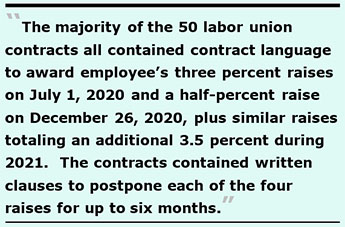 When the four met to develop the new budget, they also knew the majority of contracts with City unions — including the MEA, MUNI transit employees, SEIU Local Per Diem Nurses, and SEIU Local 1021 Miscellaneous — all contained contract language to award employees three percent raises on July 1, 2020 and a half-percent raise on December 26, 2020, plus similar raises totaling an additional 3.5 percent during 2021. The contracts contained written clauses to postpone each of the four raises for up to six months.
When the four met to develop the new budget, they also knew the majority of contracts with City unions — including the MEA, MUNI transit employees, SEIU Local Per Diem Nurses, and SEIU Local 1021 Miscellaneous — all contained contract language to award employees three percent raises on July 1, 2020 and a half-percent raise on December 26, 2020, plus similar raises totaling an additional 3.5 percent during 2021. The contracts contained written clauses to postpone each of the four raises for up to six months.
The Examiner reported Breed said “I want to be very clear — if the unions don’t agree to delay their raises, then we will be forced to lay people off. We will be forced to cut city services.” She essentially threatened City employees, suggesting her hiring binge as mayor was somehow the employees’ fault.
Forcing Contract Re-Opener
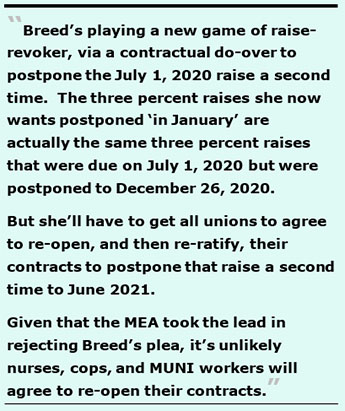 The budget Breed announced and submitted to the Board of Supervisors on July 31 was not a balanced budget, as required, because it assumes she will succeed at hoodwinking City employees into delaying their scheduled pay raises for the next two years to reportedly save her $270 million. The only way she can do that legally is if union members voluntarily agree to re-open their contracts, and she only has until December to get this done.
The budget Breed announced and submitted to the Board of Supervisors on July 31 was not a balanced budget, as required, because it assumes she will succeed at hoodwinking City employees into delaying their scheduled pay raises for the next two years to reportedly save her $270 million. The only way she can do that legally is if union members voluntarily agree to re-open their contracts, and she only has until December to get this done.
That’s not a balanced budget; it’s a gaping hole she plans to solve by kicking pay-raises bargained for in good faith down the road.
Breed’s playing a new game of raise-revoker, via a contractual do-over to postpone the July 1, 2020 raise a second time. Back in 2018, the City first got around to finally building into written labor agreements explicit language allowing postponing raises for up to six months when the City can demonstrate looming budget deficits of over $200 million. The three percent raises she wants postponed in January are actually the same three percent raises that were due on July 1, 2020 but postponed, given existing contract language.
But she’ll have to get all unions to agree to re-open, and then re-ratify, their contracts to postpone that raise a second time to June 2021. If she succeeds, she’ll probably be the first mayor to ever pull the stunt of delaying a single pay raise twice. That’s not much different than Donald Trump stiffing his contractors and employees.
Given that the MEA took the lead in rejecting Breed’s plea within 24 hours, it’s unlikely that the two nurses unions, the Police Officers Association, various trade unions, or MUNI transit employees will agree to re-open their contracts.
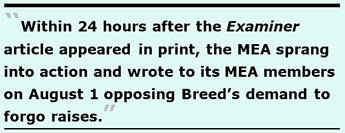 Cost of Raises Disputed
Cost of Raises Disputed
Within 24 hours after the Examiner article appeared in print, the MEA sprang into action and wrote to its MEA members on August 1 opposing Breed’s demand to forgo raises. The MEA’s position — standing in solidarity with all other labor unions — is that because the City has agreed it has over $1 billion in City reserve accounts: No layoffs. No wage cuts. And no furloughs.
MEA members — who all have a better understanding of City data than Breed does — documented that delaying the 3% raise due July 1 and delaying the 0.5% raise scheduled for December 26 would save Breed just $46.4 million, not the $55 million Breed claimed. And the MEA asserted the 3.5% raises for the following year in 2021 would save $48 million, for a combined total of $94.8 million in “savings” across the two fiscal years, not the $270 million B.S. Breed pulled out of thin air.
 The $270 million claim never made sense. If the budget savings would have been $55 million in the first year, why would it have mushroomed to $270 million in savings across the two years? Breed’s math, once again, simply doesn’t add up. Maybe math isn’t her forte.
The $270 million claim never made sense. If the budget savings would have been $55 million in the first year, why would it have mushroomed to $270 million in savings across the two years? Breed’s math, once again, simply doesn’t add up. Maybe math isn’t her forte.
Breed Asserts Her “Sacrifice”
Piously, Breed flung gasoline on the fire, saying “I don’t think this is too much to ask. We all need to do our part to share in that sacrifice.” This is more hubris: What sacrifice did she share?
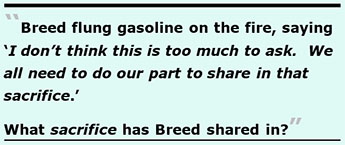 On July 1, 2018 she became mayor and her salary increased from $121,448 as a member of the Board of Supervisors to $322,073 as mayor through June 30, 2019 — a whopping 165.2 percent change increase in salary. That’s not what most folks call sacrifice.
On July 1, 2018 she became mayor and her salary increased from $121,448 as a member of the Board of Supervisors to $322,073 as mayor through June 30, 2019 — a whopping 165.2 percent change increase in salary. That’s not what most folks call sacrifice.
Despite that $200,625 raise in pay, she accepted $5,600 split between two payments during 2019 from her subordinate, Mohammed Nuru, which she only belatedly got around to officially reporting to the Ethics Commission on May 29, 2020. Nuru first gifted Breed a $4,809 car repair bill on January 10, 2019.
After Nuru’s first gift Breed received another $28,462 raise on July 1, 2019 pushing her salary to $350,535 through June 30, 2020 — an additional 8.8 percent change increase in salary. Folks don’t call that a sacrifice, either.
 While Breed and the other 16 elected city officials on the City payroll who earned a combined total of $2.5 million ending June 30, 2020 did not receive a raise on July 1 from the Civil Service Commission, eliminating raises previously negotiated should not apply to city employees covered by union contracts.
While Breed and the other 16 elected city officials on the City payroll who earned a combined total of $2.5 million ending June 30, 2020 did not receive a raise on July 1 from the Civil Service Commission, eliminating raises previously negotiated should not apply to city employees covered by union contracts.
Inexplicably, she then received Nuru’s second gift of a paltry $719 for a car rental 12 months later on Christmas Eve in December 2019 — after having pocketed $229,000 in City pay raises. Why was there a one-year delay between Nuru’s two gifts to her?
Decade-Long Mayoral Hiring Binge Was Unsustainable
If Lee or Breed learned nothing else as mayor, they should have at least learned that their decade-long patronage hiring binge of employees earning over $100,000 annually was unsustainable.
 Table 1 illustrates that when Ed Lee was sworn in as Mayor on January 11, 2011 he inherited former Mayor Newsom’s FY 2010–2011 City budget of $6.6 billion. Two years later, London Breed was sworn in as a City Supervisor in January 2013; she became Board president two years later in January 2015. The ten budgets Lee and Breed submitted between FY 2011–2012 and FY 2020–2021 increased the City budget by $7.1 billion — to a staggering $13.7 billion — a 108% percent increase over Newsom’s final budget.
Table 1 illustrates that when Ed Lee was sworn in as Mayor on January 11, 2011 he inherited former Mayor Newsom’s FY 2010–2011 City budget of $6.6 billion. Two years later, London Breed was sworn in as a City Supervisor in January 2013; she became Board president two years later in January 2015. The ten budgets Lee and Breed submitted between FY 2011–2012 and FY 2020–2021 increased the City budget by $7.1 billion — to a staggering $13.7 billion — a 108% percent increase over Newsom’s final budget.
Table 1: Ten-Year Increase in San Francisco City Budget

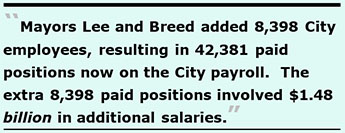 Table 2 illustrates that Lee and Breed added 8,398 City employees, resulting in 42,381 paid positions now on the City payroll through June 30, 2020. The extra 8,398 paid positions involved $1.48 billion in additional salaries (excluding fringe benefits), pushing the City Controller’s payroll to $3.98 billion in total pay (before benefits).
Table 2 illustrates that Lee and Breed added 8,398 City employees, resulting in 42,381 paid positions now on the City payroll through June 30, 2020. The extra 8,398 paid positions involved $1.48 billion in additional salaries (excluding fringe benefits), pushing the City Controller’s payroll to $3.98 billion in total pay (before benefits).
Table 2: Increase in Budgeted Positions Citywide

Table 3 illustrates several important issues involving salary inequities among City employees.
Table 3: Increase in Salary Inequities in San Francisco Government: FY 2010–2011 to FY 2019–2020

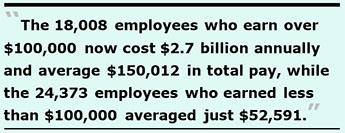 now paid over $100,000 in total salaries.
now paid over $100,000 in total salaries.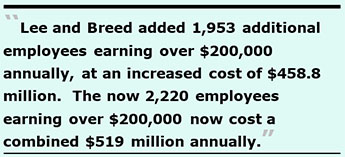 The inequities are even more stark if you look only at the number of employees earning over $200,000.
The inequities are even more stark if you look only at the number of employees earning over $200,000.
Table 4 illustrates that across that decade, Lee and Breed added 1,953 additional employees earning over $200,000 annually, at an increased cost of $458.8 million. In 2010–2011, there were just 267 employee earning over $200,000 at a total cost of just $60.3 million. The now 2,220 employees earning over $200,000 now cost a combined $519 million annually, having risen by fully $459.8 million. The increase from 267 to 2,220 employees earning over $200,000 annually represents a 731.5 percent change increase.
Table 4: Rise in Number of Employees Earning Over $200,000: FY 2010–2011 to FY 2019–2020

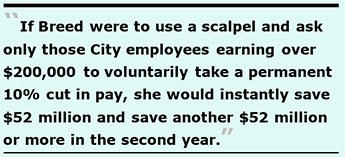 Notably, rather than wielding a cudgel by demanding all City employees agree to postpone their raises until July 2021, if Breed were to use a scalpel and ask only those City employees earning over $200,000 to voluntarily take a permanent 10% cut in pay, she would instantly save $52 million, more than the $46.4 million the MEA had identified as being the value of the raises. She’d save another $52 million or more in the second year, for a total of $104 million.
Notably, rather than wielding a cudgel by demanding all City employees agree to postpone their raises until July 2021, if Breed were to use a scalpel and ask only those City employees earning over $200,000 to voluntarily take a permanent 10% cut in pay, she would instantly save $52 million, more than the $46.4 million the MEA had identified as being the value of the raises. She’d save another $52 million or more in the second year, for a total of $104 million.
Although the now 2,220 employees earning over $200,000 would face average pay cuts of $23,494 by taking an imposed 10% reduction in pay, they would all still earn average salaries of $211,445, not bad chump change for public-sector jobs.
Growth in Senior Managers
Between Lee and Breed, they went on a hiring and promotion binge of senior City managers. It’s not clear why the City needed so many more managers.
Table 5: Rise in Number of Employees Earning Over $250,000: FY 2010–2011 to FY 2019–2020

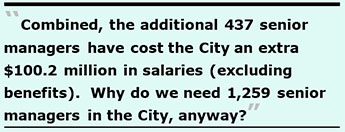 Table 5 shows that among the new hires and promotions under Lee and Breed, 150 additional senior managers were added at MUNI (at an increased cost of $25.9 million), and 287 senior managers hired or promoted in the 50-plus additional City departments (at an increased cost of $74.3 million). Combined, the additional 437 senior managers have cost the City an extra $100.2 million in salaries (excluding benefits). Why do we need 1,259 senior managers in the City, anyway?
Table 5 shows that among the new hires and promotions under Lee and Breed, 150 additional senior managers were added at MUNI (at an increased cost of $25.9 million), and 287 senior managers hired or promoted in the 50-plus additional City departments (at an increased cost of $74.3 million). Combined, the additional 437 senior managers have cost the City an extra $100.2 million in salaries (excluding benefits). Why do we need 1,259 senior managers in the City, anyway?
 Breed’s Own Hiring Binge
Breed’s Own Hiring Binge
Lest anyone say the senior manager and excessive salaries hiring binge was all Ed Lee’s fault, a look at Breed’s own record is in order. Of the $1.48 billion added to the City payroll (less fringe benefits) since FY 2010–2011, Breed added $203.4 million by herself, 13.7% of the total increase.
Table 6: Rise in Number of Employees Earning Over $100,000: FY 2018–2019 to FY 2019–2020

Table 6 illustrates that the City Controller’s payroll database reveals that in the one-year period between FY 2018–2019 to FY 2019–2020 Breed eliminated 2,956 employees (from 27,329 down to 24,373) earning less than $100,000 in order to save her $38.1 million cut from the City payroll.
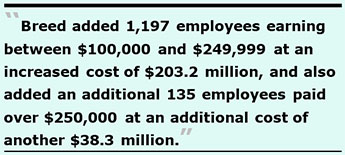 Across the same one-year period, Breed added 1,197 employees earning between $100,000 and $249,999 at an increased cost of $203.2 million, and also added an additional 135 employees paid over $250,000 at an additional cost of another $38.3 million. Those 1,232 additional employees earning over $100,000 was in her budget submissions, not Lee’s budgets.
Across the same one-year period, Breed added 1,197 employees earning between $100,000 and $249,999 at an increased cost of $203.2 million, and also added an additional 135 employees paid over $250,000 at an additional cost of another $38.3 million. Those 1,232 additional employees earning over $100,000 was in her budget submissions, not Lee’s budgets.
On paper, it looks like the $38.1 million Breed saved by eliminating the 2,956 employees earning less than $100,000 was used to fund the $38.3 million awarded to the extra 135 employees earning over $250,000. Patronage cost-shifting never looked more obvious.
Breed’s Assault on Civil Service Positions
 To be able to hire or promote 1,232 employees earning over $100,000 across that one year period and increase their pay by a combined $241.5 million, Breed pulled out her cudgel again and took a whack at civil service positions — rather than looking for cuts in other areas of the City budget that are rampant with fraud and gross waste.
To be able to hire or promote 1,232 employees earning over $100,000 across that one year period and increase their pay by a combined $241.5 million, Breed pulled out her cudgel again and took a whack at civil service positions — rather than looking for cuts in other areas of the City budget that are rampant with fraud and gross waste.
Table 7: Breed’s Changes to Civil Service Jobs : FY 2018–2019 to FY 2019–2020
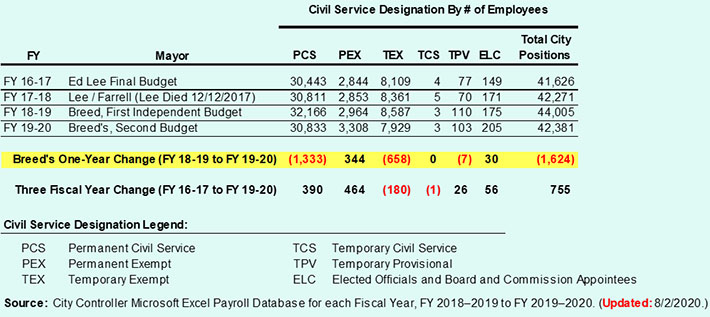
Table 7 illustrates (among other things):
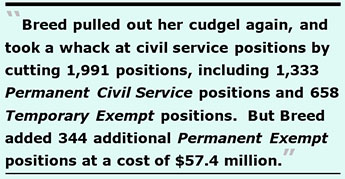 Across that single-year period, Breed eliminated 1,991 positions, including 1,333 Permanent Civil Service positions, and 658 Temporary Exempt positions, the latter of which are typically jobs paying less than $100,000.
Across that single-year period, Breed eliminated 1,991 positions, including 1,333 Permanent Civil Service positions, and 658 Temporary Exempt positions, the latter of which are typically jobs paying less than $100,000. Breed Flunks Logic 101
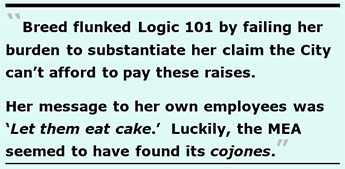 Steve Benen, an award-winning producer on MSNBC’s Rachel Maddow Show notes that when it comes to Logic 101, people who make outlandish, baseless claims have the burden of substantiating their claims and their underlying data. . In other words, it was Breed’s burden to prove the City can’t afford to pay these pay raises and substantiate her claim. She failed that burden.
Steve Benen, an award-winning producer on MSNBC’s Rachel Maddow Show notes that when it comes to Logic 101, people who make outlandish, baseless claims have the burden of substantiating their claims and their underlying data. . In other words, it was Breed’s burden to prove the City can’t afford to pay these pay raises and substantiate her claim. She failed that burden.
It’s not up to opponents or critics to disprove Breed’s baseless nonsense. It’s not the responsibility of the MEA, POA, or any other City labor organization to disprove Breed’s claim that her piggy bank ran dry. The MEA, however, did document that the City is sitting on $1 billion in reserves, blowing a hole in Breed’s logic. It’s entirely Breed’s burden to demonstrate why the MEA is incorrect.
Where’s the Surgical Scalpel?
It took lot of chutzpah for Breed introduce a controversial proposal to strip City employees of their pay raises during a pandemic. Breed’s message to her own employees was essentially “Let them eat cake.”Thousands of City employees instantly understood she wasn’t watching their backs. She was watching her own backside, by doing the least amount of budget planning she could get away with. What she didn’t count on was that her own employees wouldn’t be so dumb by shooting themselves in the foot.
It’s clear Breed wanted to balance her budget on the backs of the City’s lowest-wage employees by demanding contracts be re-opened and all employees forgo scheduled raises. Luckily, the MEA seemed to have found its cojones. Instead of simply caving into her demands, the MEA sang Breed a sweet song: “Gee, Officer Krupke, Krup you!”
 Instead of using an across-the-board budget cudgel that all employees forgo pay raises, Breed should have pulled out one of SFGH’s scalpel’s to surgically chop City salaries over $100,000 from the top, since those salaries seem to have metastasized during her watch. Maybe Director of Public Health Grant Colfax — wearing a face mask — could show Breed how to wield a scalpel, not a cudgel.
Instead of using an across-the-board budget cudgel that all employees forgo pay raises, Breed should have pulled out one of SFGH’s scalpel’s to surgically chop City salaries over $100,000 from the top, since those salaries seem to have metastasized during her watch. Maybe Director of Public Health Grant Colfax — wearing a face mask — could show Breed how to wield a scalpel, not a cudgel.
Since the City is sitting on over $1 billion in reserve accounts, the MEA is right : No layoffs. No wage cuts. And no furloughs.
Monette-Shaw is a columnist for San Francisco’s Westside Observer newspaper, and a member of the California First Amendment Coalition (FAC) and the ACLU. He operates stopLHHdownsize.com. Contact him at monette-shaw@westsideobserver.com.
Postscript
While prepping this article to upload to the Internet, I was shocked when I received an e-mail from Mayor Breed on August 11, 2020 in which she went begging for $46 campaign donations to celebrate her 46th birthday. Apparently, she’s not interested in small donations of $5 or $10, and is appealing to her donor base who can afford higher-amount political contributions.
So first, she threatens employees with layoffs if they don’t cave in to her foot-stomping and demand getting their raises on schedule. Then the MEA essentially tells her “Hell, No!” (or more politely, “go fly a kite”).
And then she goes begging for campaign donations? She’s a real piece of work.
Her e-mail groveling for campaign cash (even though she’s not facing re-election until 2023) arrived just 10 days after the Examiner reported Breed wants all City employees to forgo raises for an additional year. When you plan to beg people for money in the way of birthday gifts, is it such a good idea to first demand that they give up scheduled raises?
Somebody should tell Breed that using “XOXO,” or “XOOXXOO” above her signature block as a “complimentary close” on what is essentially a business letter is juvenile, and should be reserved for actual love letters. In addition to being tacky, it’s inappropriate for use in business or campaign correspondence, as any Secretary II on the City payroll worth their salt could easily mentor her on.
[Likewise, use of an ampersand (“&”) to replace the word “and” (which takes just two more keystroke characters to type than using an “&”) is the height of laziness, and is also inappropriate for use in formal business correspondence, unless it’s in the title of an article or book, or unless it appears in the legal name of a corporation.]
Sing-songing “Happy Birthday to Me, No Raises for Thee!” during a health pandemic was especially cruel.

August 22 Update: Cops Cave in to Breed; PEC Rejects Mayor’s Proposed Pay Freeze
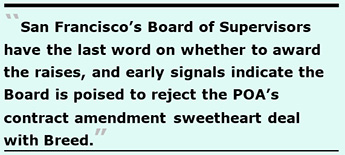 San Francisco’s Police Officers Association (POA) was painfully aware of calls nationwide to tie labor contracts with police unions to progress on implementing police reforms. As an end run to prevent having police reform language incorporated into its contract, the POA rapidly pushed through a sweetheart contract change increasing only their pay without opening up their full contract to sorely needed meet-and-confer issues around police reform.
San Francisco’s Police Officers Association (POA) was painfully aware of calls nationwide to tie labor contracts with police unions to progress on implementing police reforms. As an end run to prevent having police reform language incorporated into its contract, the POA rapidly pushed through a sweetheart contract change increasing only their pay without opening up their full contract to sorely needed meet-and-confer issues around police reform.
The bad news is that the Examiner broke news on August 18 that police offers have agreed to delay their raises, caving in to Breed’s phony math. By doing so, the cops essentially betrayed their brothers and sisters in all other City labor unions.
The good news is San Francisco’s Board of Supervisors have the last word on whether to award the raises, and early signals indicate the Board is poised to reject the POA’s contract amendment sweetheart deal with Breed. The San Francisco Labor Council’s Public Employee Committee (PEC) informed Breed on August 17 that 16 PEC member unions stand united in rejecting the Mayor’s proposed cuts to scheduled raises.
The 16 unions included SEIU Local 1021, the International Brotherhood of Electrical Workers, the Transit Workers Union (representing MUNI drivers), SEIU Per Diem Nurses, and the International Federation of Professional and Technical Employees (IFPTE) Local 21 (that represents the second-highest paid City employees), and other unions.
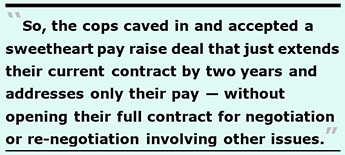 The Examiner’s August 18 article was the first time we learned Breed had threatened back in June that up to 300 police officers could be laid off if she didn’t get her way (should they have refused to delay their raises a second time). So, the cops caved in and accepted a sweetheart pay raise deal that just extends their current contract by two years and addresses only their pay — without opening their full contract for negotiation or re-negotiation involving other issues. As their sweetheart reward, they’ll receive an additional 3% raise in 2022 and a second 3% raise in 2033, which will probably cost at least an additional $11.4 million in 2022 and $11.7 million in 2023. Sweethearts don’t come cheaply, even during years of on-going budget deficits.
The Examiner’s August 18 article was the first time we learned Breed had threatened back in June that up to 300 police officers could be laid off if she didn’t get her way (should they have refused to delay their raises a second time). So, the cops caved in and accepted a sweetheart pay raise deal that just extends their current contract by two years and addresses only their pay — without opening their full contract for negotiation or re-negotiation involving other issues. As their sweetheart reward, they’ll receive an additional 3% raise in 2022 and a second 3% raise in 2033, which will probably cost at least an additional $11.4 million in 2022 and $11.7 million in 2023. Sweethearts don’t come cheaply, even during years of on-going budget deficits.
Police Officers Association (POA) president Tony Montoya tried crude spin control, saying the officers’ vote for the deal was a testament to their sacrifice. Gaining commitment for a combined 6% pay increase is not a sacrifice. It’s economic inequity.
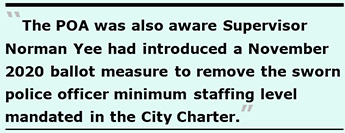 It’s obvious that the cops could see the writing on the wall, given the Black Lives Matter and #DefundThePolice movements. They were well aware Breed and Supervisor Shamann Walton had engineered a $120 million cut to SFPD’s FY 2020–2021 budget. To cut off public debate in San Francisco about SFPD’s budget, the POA hoped to score a victory getting its members to cave in to Breed before public hearings could be held.
It’s obvious that the cops could see the writing on the wall, given the Black Lives Matter and #DefundThePolice movements. They were well aware Breed and Supervisor Shamann Walton had engineered a $120 million cut to SFPD’s FY 2020–2021 budget. To cut off public debate in San Francisco about SFPD’s budget, the POA hoped to score a victory getting its members to cave in to Breed before public hearings could be held.
The POA was also aware that Supervisor Norman Yee, president of the Board of Supervisors, had introduced a ballot measure on May 19, 2020 for the November ballot to remove the sworn police officer minimum staffing level mandated in the City Charter. Six days later, George Floyd was murdered by Minneapolis police officers on May 25, sparking nationwide protests calling for police reform, including reform of how police union contracts are negotiated. Yee’s Charter change measure made it onto November’s ballot, and needs a 50%+1 vote to pass.
POA’s Betrayal of Unionism
As the MEA wrote its members on August 1, when it comes to issues that impact City employees the central tenet of unionism is collective action to improve working conditions for all employees. And during collective bargaining, actions should be guided by standing together with fellow workers represented by other unions to achieve the best outcomes for all employees.
I’m aware that before the cops voted over the August 15 weekend to cave into Breed, the Police Officers Association had received a copy of MEA’s letter that documented the City is sitting on $1 billion in reserve accounts.
Police officers all know that SFPD has more sworn officers than mandated, contrary to misinformation foisted on the public.
Table 8: SFPD Payroll Data FY 2019–2020 (Through 6/3/2020)

Payroll data shown in Table 8 illustrates:
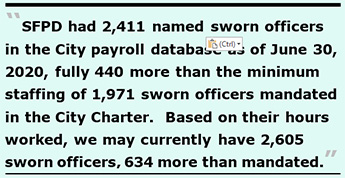 SFPD had 2,411 sworn officers, (including Police Officers, Sergeants, Lieutenants, and Captains) named in the City payroll database as of June 30, 2020, fully 440 more than the minimum staffing of 1,971 sworn officers mandated by the changes to the 1994 City Charter. The 1,971 number is totally arbitrary. While the POA and SFPD make a lot of noise about not being staffed at the Charter-mandated sworn officer staffing level, data in the City Controller’s payroll database proves otherwise. This is yet another red herring offered up by the POA.
SFPD had 2,411 sworn officers, (including Police Officers, Sergeants, Lieutenants, and Captains) named in the City payroll database as of June 30, 2020, fully 440 more than the minimum staffing of 1,971 sworn officers mandated by the changes to the 1994 City Charter. The 1,971 number is totally arbitrary. While the POA and SFPD make a lot of noise about not being staffed at the Charter-mandated sworn officer staffing level, data in the City Controller’s payroll database proves otherwise. This is yet another red herring offered up by the POA.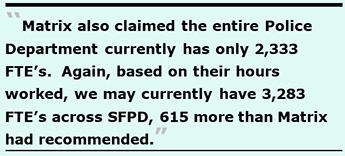 Matrix Consulting recommended the (low-ball) 1,911 sworn officer FTE’s be increased to 2,106 FTE’s, but the City already has 500 more sworn officers based on their actual FTE hours worked than Matrix had recommended.
Matrix Consulting recommended the (low-ball) 1,911 sworn officer FTE’s be increased to 2,106 FTE’s, but the City already has 500 more sworn officers based on their actual FTE hours worked than Matrix had recommended.In addition to having more sworn officers than the City Charter mandates, there’s a problem with the increase of Community Police Service Aides.
Some time before 2009, Police Officers assigned to San Francisco’s International Airport advocated for hiring community aides, in part to help prevent police officers from performing a variety of tasks that don’t require the training and status of sworn peace officers.
Community Police Services Aides are paraprofessionals who perform a variety of police-related duties for the San Francisco Police Department, including directing traffic, issuing citations for parking violations, processing complaints, completing reports, assisting ill or injured citizens, and entering and retrieving information in computer systems, among other duties.
Table 9: Ten-Year Growth in Community Police Service Aides CY 2009 vs. FY 2010–2011 to FY 2019–2020

 Table 9 illustrates:
Table 9 illustrates:
POA Contract Without Police Reforms Should Be Rejected
Long before the world erupted in outrage following George Floyd’s death at the hands of police officers last May, everybody (including the U.S. DOJ) was saying the way the U.S. does policing was fundamentally broken. Demands for reform regarding use-of-force policies have been going on for an exceptionally long time, even before Floyd’s tragic death. And those calls for police reform include incorporating language mandating reforms into police union contracts before they are awarded pay raises. Contracts not containing reform language are not going to speed up any reforms. Their contracts should not be approved without necessary reform concessions incorporated into contract language.
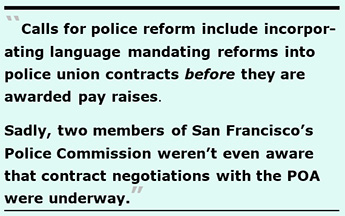 The 6% raises deal the cops reached with Breed contain no concessions on use of force, shift rules, or discipline, or any other provisions to increase police reform. The Police Department can’t even change shift schedules to use existing resources better, because that would require a “meet and confer” session with the POA.
The 6% raises deal the cops reached with Breed contain no concessions on use of force, shift rules, or discipline, or any other provisions to increase police reform. The Police Department can’t even change shift schedules to use existing resources better, because that would require a “meet and confer” session with the POA.
But the tentative contract police officers just voted to approve contained no provisions for any police reforms, and there was no community input during contract negotiations. Sadly, it appears that two members of San Francisco’s Police Commission — Cindy Elias and Damali Taylor — weren’t even aware contract negotiations with the POA were underway; Elias was quoted as saying she had no idea negotiations were happening.
How can the Police Commission not be aware of when the POA is involved in active bargaining with the City for police officer wages and working conditions? Shouldn’t the Police Commission be recommending to the Board of Supervisors whether or not to approve police officer contracts?
The deal the cops struck with Breed had no community involvement at all. Advocates for police reform believe public hearings on police union contracts should be held before contract negotiations begin, in part to ensure the contracts serve the common good. How can the Board of Supervisors or Mayor be held accountable for the contracts they negotiate when members of the public aren’t informed about details in the collective bargaining agreements before contracts are signed?
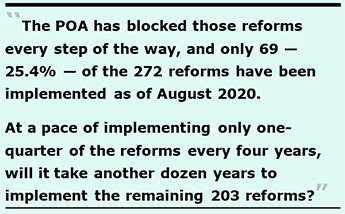 The POA was hell bent on getting its contract extended for two years and gobble 6% in additional raises because it didn’t want the entire contract opened up for re-negotiation, given that the Black Lives Matter movement had taken off. It’s clear the POA wanted a wage increase without having to include police reform provisions in their contracts.
The POA was hell bent on getting its contract extended for two years and gobble 6% in additional raises because it didn’t want the entire contract opened up for re-negotiation, given that the Black Lives Matter movement had taken off. It’s clear the POA wanted a wage increase without having to include police reform provisions in their contracts.
Its current three-year contract for July 1, 2018 to June 30, 2021 was negotiated and agreed to in March 2018. That was two years after the U.S. Department of Justice had issued a report in late 2016 calling on San Francisco and the SFPD to implement 272 recommendations for police reform in the City. The POA has blocked those reforms every step of the way, and only 69 — 25.4% — of the reforms have been implemented as of August 2020, fully four years after the DOJ’s report was issued.
At a pace of implementing only one-quarter of the reforms every four years, will it take another dozen years to implement the remaining 203 reforms? Or will the POA and SFPD drag their feet even longer, and take two full decades to implement all 272 reforms? Will it take a full generation of turn-over in SFPD’s ranks before all of the DOJ’s 2016 reform recommendations are fully implemented? Not fully opening their contracts to negotiate reforms will exacerbate the decades-long wait. Accepting their two-year pay raise sweetheart deal was designed to drag out the wait for police reforms.
When the POA contract is presented to the Board of Supervisors for final approval, the Board should reject it unless, and until, it includes explicit police reform provisions contained in the written contract.
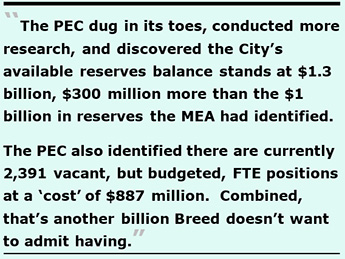 PEC Finds Another $1 Billion
PEC Finds Another $1 Billion
The PEC identified an additional $300 million in available budget reserves, and another $887 million sittting unused as budgeted, but unfilled positions, making both the delays of raises for all City employees, and the sweetheart deal with the POA unnecessary.
In its August 17 letter to Breed (through San Francisco’s Department of Human Resources director, Micki Callahan), the PEC noted:
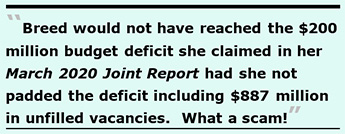 In addition, the PEC identified that there are currently 2,391 vacant, but budgeted, FTE positions (using FTE status as the metric, not individually named employees) at a “cost” of $887 million — nearly a billion dollars! — that remain vacant despite being included in the City budget. (Note: Those unfilled positions are obviously not included in the City Controller’s payroll data reported throughout this article.) Breed could easily pay the delayed pay raises — even to cops — by eliminating those unfilled vacancies from her budget. Indeed, she would not have reached the $200 million budget deficit she claimed in her March 2020 Joint Report to impose the delays to scheduled July 1, 2020 raises had she not padded the deficit by including $887 million in unfilled vacancies. What a scam!
In addition, the PEC identified that there are currently 2,391 vacant, but budgeted, FTE positions (using FTE status as the metric, not individually named employees) at a “cost” of $887 million — nearly a billion dollars! — that remain vacant despite being included in the City budget. (Note: Those unfilled positions are obviously not included in the City Controller’s payroll data reported throughout this article.) Breed could easily pay the delayed pay raises — even to cops — by eliminating those unfilled vacancies from her budget. Indeed, she would not have reached the $200 million budget deficit she claimed in her March 2020 Joint Report to impose the delays to scheduled July 1, 2020 raises had she not padded the deficit by including $887 million in unfilled vacancies. What a scam! 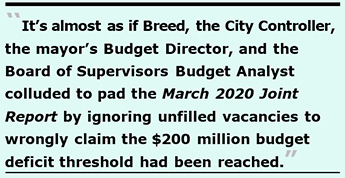 It’s almost as if Breed, the City Controller, the mayor’s Budget Director, and the Board of Supervisors Budget Analyst wrongly colluded to pad the March 2020 Joint Report by ignoring unfilled vacancies to wrongly claim the $200 million budget deficit threshold had been reached, hoping MEA and PEC employees wouldn’t notice their slight-of-hand trickery.
It’s almost as if Breed, the City Controller, the mayor’s Budget Director, and the Board of Supervisors Budget Analyst wrongly colluded to pad the March 2020 Joint Report by ignoring unfilled vacancies to wrongly claim the $200 million budget deficit threshold had been reached, hoping MEA and PEC employees wouldn’t notice their slight-of-hand trickery.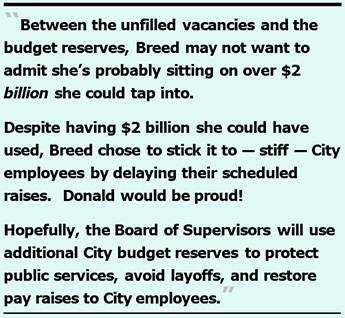 The PEC’s letter notes that 10 of the 11 members of the Board of Supervisors have signed on to a commitment to use additional City budget reserves to protect public services. Hopefully, that means the 10 Supervisors will force Breed to pay the wrongly-delayed raises! After all, budget hearings have just gotten underway and Breed’s budget submission hasn’t been adopted.
The PEC’s letter notes that 10 of the 11 members of the Board of Supervisors have signed on to a commitment to use additional City budget reserves to protect public services. Hopefully, that means the 10 Supervisors will force Breed to pay the wrongly-delayed raises! After all, budget hearings have just gotten underway and Breed’s budget submission hasn’t been adopted. More hopefully, the Board of Supervisors will use additional City budget reserves to protect public services, avoid layoffs, and restore delayed pay raises to City employees.